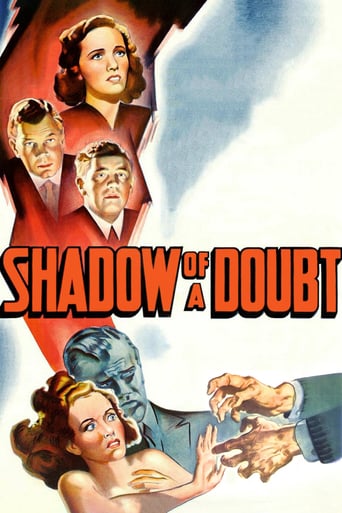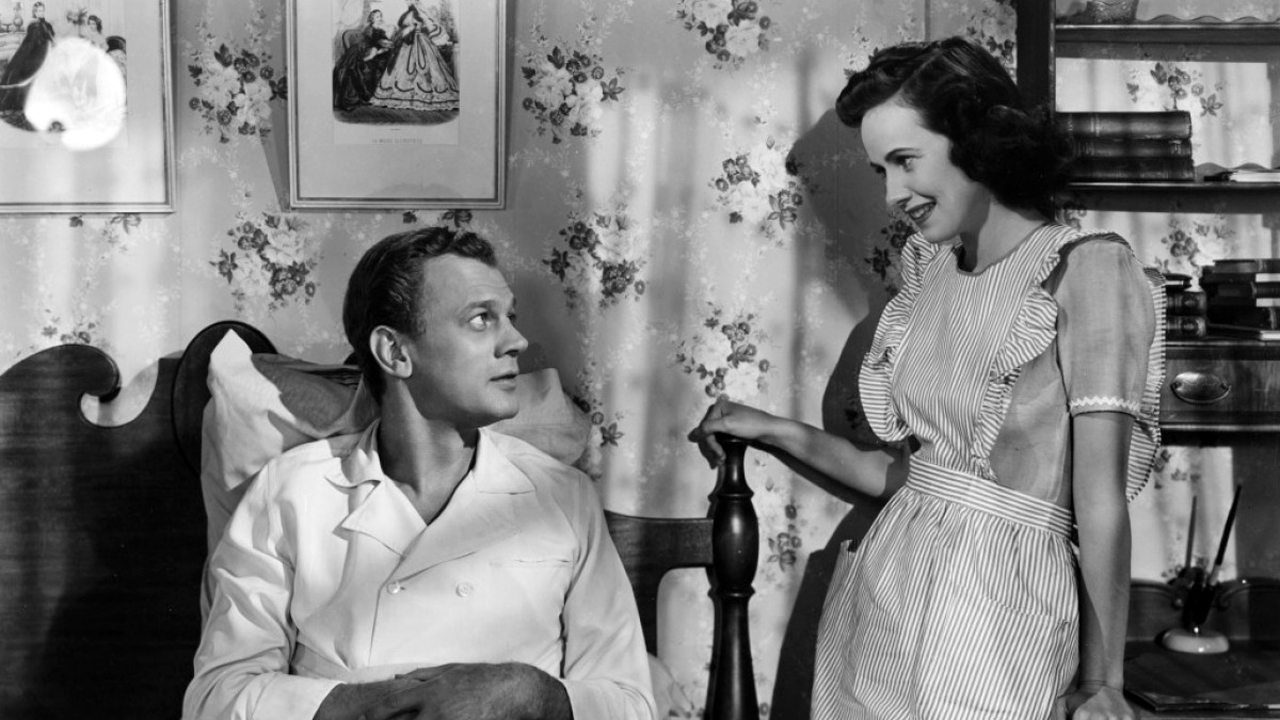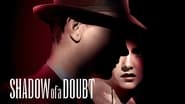Coventry
"Shadow of a Doubt" was reputedly Alfred Hitchcock's favorite of his own films, and I guess that really must mean something since he directed more than three dozen of versatile cinematic classics that are all universally considered as brilliant. With all due respect, however, I don't concur with the Master. Even though "Shadow is a Doubt" is an intelligently scripted and highly original thriller, my personal preferences lie with the more visceral horrors that Hitch made, like "Psycho", "Frenzy" and "The Birds". Nevertheless, I like to think it's very significant that Hitchcock names this one as his favorite and, to me, it proves that he also has a predilection for horror and sadism. Rather than choosing for his uptight thrillers ("Read Window", "Vertigo" ...) or his convoluted conspiracy thrillers ("North by Northwest", "The Man Who Knew Too Much" ...), he prefers the dark little tale of a cold-hearted psychopath arriving in a sleepy small town and turning the lives of his unsuspecting family members upside down. Our visionary director clearly finds tremendous joy in unleashing pure evil, in the shape of charming and wealthy self-made man "Uncle" Charlie Oakley, upon the peaceful community of Santa Rosa, California. But even more remarkable is that the naïve and picturesque community, and particularly Charlie's beloved adolescent niece (also named Charlie after her uncle), is subconsciously craving for and warmly welcoming the embodiment of evil! Young Charlie is desperate for some excitement in her mundane life, so imagine the confusion when she slowly realizes that her "special-bond" uncle is the notorious Merry Widow Murderer and the subject of a nationwide police manhunt. It's praiseworthy how Alfred Hitchcock delivers a tense and atmospheric thriller in which the fearsome serial killer isn't even seen committing any of the vile crimes he's wanted for! Young Charlie puts the pieces of the mysterious puzzle together herself, with the help of her love-interest police inspector, and meanwhile Uncle Charlie becomes less lovable and more menacing. I've rarely seen a director playing with the emotions of his lead characters so efficiently, while both Theresa Wright and the genius Joseph Cotton make the most out of their unusual roles. The eye of detail in the script and in Hitchcock's direction is fantastic! For example: as a sort of running game, young Charlie's father and a befriended neighbor (Hume Cronyn) are always debating original and vicious methods for murdering each other, even though they are both normal and slightly dull family men. It's further proof of how the whole of Santa Rosa is unwillingly embracing the coming of evil. I'm changing my mind, in fact... "Shadow of a Doubt" must be listed in my top five favorite Hitchcock films!
christopher-underwood
With the rousing score of Dimitri Tiomkin and the wonderful camera work, this captivates from the very beginning. We switch from the tight, small lodging out into wide open and view a chase on foot from above, runners and shadows racing before us as we wonder just what is afoot. As it happens we are to find out that Joseph Cotton's character is guilty almost straight away yet spend the rest of the film in suspense as we doubt ourselves. This partly because of the tale of his personal history and partly because of the love and affection of his niece, a wonderful performance from Teresa Wright. Shot largely on location and using a lovely old property in which the large family tumble this way and that in marvellous abandon while the lady of the house tries to maintain control. I learn from the extras that in the end, more shots were required by Hitch and so a set had to be built anyway replicating the building. A very fine, involving, moving and suspenseful film.
sharky_55
I wonder what sort of film Shadow of a Doubt might be if Hitchock had cut that opening sequence with Cotten dodging the two agents and whisking away to a safer place. Sure, it does establish his boldness and knack for disappearing right in front of our very eyes (it helps that they do not know what he looks like so he can walk right by them) but it also establishes for a fact that Uncle Charlie is hiding something, and somewhat undermines the slow process of discovery that Charlotte has to go through. Surely the absence of it would make the best scene of the film even better. We overhear Joseph and Herbie musing as they always do, and they mention that the Merry Widow Murderer is dead. Then Cotten climbs the stairs, the slowly and deliberately turns back to give a pointed, menacing look back at Charlie in the sliver of sunlight in the doorstep. The soundtrack climaxes, and in that moment both characters know exactly where the real murderer, and so does the audience. It's a stunning moment of silent tension, mainly because neither can directly admit what they know, and everything else afterwards is merely a formality. The final 'fight' is a little silly now, and the forced romance with Detective Graham seems as though they plucked the nearest available male to give a little comfort for the young Charlie.The two Charlies are certainly a shining light here. Wright does not nearly resemble the teenager she plays (she was in her mid 20s) but by all means is radiant; she has the kind of vivacity and youthful idealism from the get go that Hitchcock ladies aren't often armed with and is the shining light from the start. She rises from the cosy domesticity of the small town as if she were totally aware that there is no other way to kickstart the movie than to get Uncle Charlie into the frame, and then beams constantly at how what a mysterious and imposing character he is. She has the all the imperative here. Opposing her is the sharp- eyed Cotten, who juggles the appearance of a family man rather well, only cracking once to give a frightful monologue. The clash between the leading pair makes the movie a worthwhile study in tension; we can see Hitchcock winking from every scene as Charlie goes closer and closer to discovering the truth, even as she chalks it all up the the excitement of her uncle's enigmatic lifestyle. When she first receives a murdered victim's watch, they key light flashes a little glint in her eye, but it's not yet the moment of discovery - she is merely overjoyed at such a cool present from such a cool uncle. A shake up indeed. What the intro does allow is for all these Hitchock nods at the source of the criminal contrasted with Charlie's initial obliviousness; the way she wonders how they just happen to be the 'average' family chosen for a nation-wide survey, the way Emma shrieks at the visitors to not take pictures of the ugly scenery, and the running dialogue of Joseph and Herbie as crime enthusiasts who endlessly speculate on the perfect murder. First it is a harmless hobby. Later it inserts a grim subtext until Charlie cannot bear it any longer. It's the classical build-up of dramatic irony, and Hitchock subverts his own tendencies; Wright closes the door and leans against it suggestively, and then Cotten grasps her hands roughly as he snatches the newspaper fragment, and for a moment, the pose is like two lovers about to embrace and kiss. But by foregoing that convention dynamic we have something a lot more interesting.
grschreck75
Shadow of a Doubt was, according to the Director himself, Hitchcock's favorite of his films, most likely because it opened a door for his later work. He had moved past the point of merely trying to thrill an audience, instead towards shocking them. Coming from an outsider's perspective, Hitchcock saw America for what it was at the time: a culture obsessed with war and violence that wanted to bury the past. America had been involved in World War II for several years at this point, those left behind were mainly older people who had little to do outside of work. He knew people wanted to see a good murder-mystery, and he finally poked at people's interest in the subject, by putting them in the story.Beginning in the average home life of the time, Hitchcock unsettles everything by introducing Uncle Charlie. The viewer is immediately introduced to Charlie's world, where we understand right away that he is a murderer evading the police. But to his family, Uncle Charlie is a charming, charismatic, handsome man, who is also obviously disturbed in some way. The way the characters choose to ignore this fact is telling. Uncle Uncle Charlie obviously has some sort of past abuse of some form or another in order to be a violent criminal, and his character lets his resentment known a number of times. The fact that no one had even attempted at this point to examine what made someone this way is revolutionary, and is not merely a coincidence. Uncle Charlie seems intent on burying the past the same way everyday people at time also attempted. Regardless, he is desperate to bring the family together, even though it can't be ignored that he is a criminal trying to hide himself in a normal setting. The fact that Hitchcock had chosen to bring a killer into a family setting is the source of the film's suspense. He was trying to get under the skin of everyday people at the time. All he had to do to in order to achieve this, was put Uncle Charlie at a dinner table with everyday people. The dinner scene carries the entire significance of the film. All focus is put on Uncle Charlie during the scene. We see, in close up, Uncle Charlie summarize his harsh feelings towards his targets, in a way that the audience is unable to ignore. It defines the entire work, and it is masterfully executed. Make sure to watch intently as it happens.The entire film hints at something unseen. Alfred Hitchcock knew that suspense came from a more mysterious place, and this is him executing that at a masterful level.



 AD
AD












